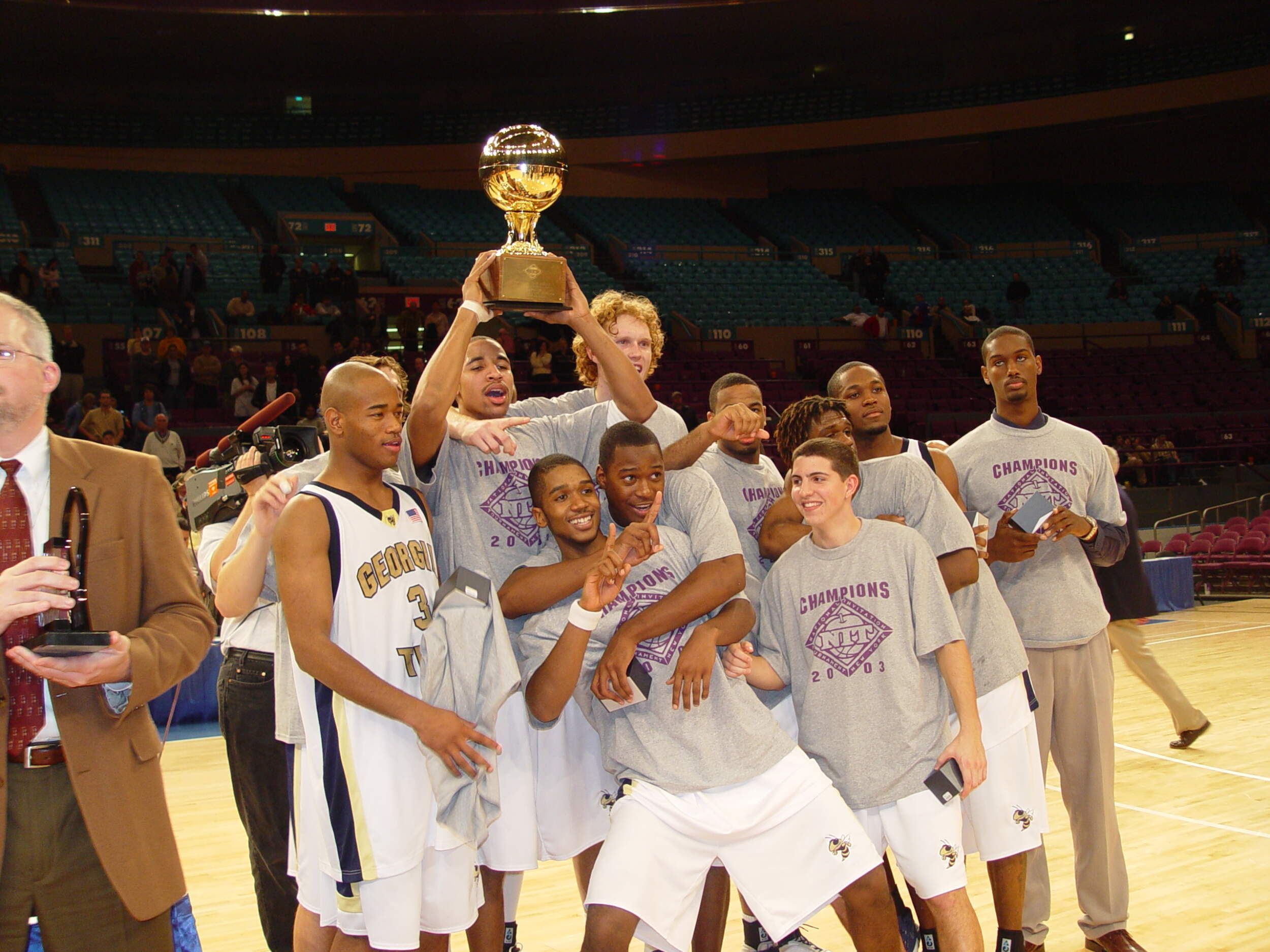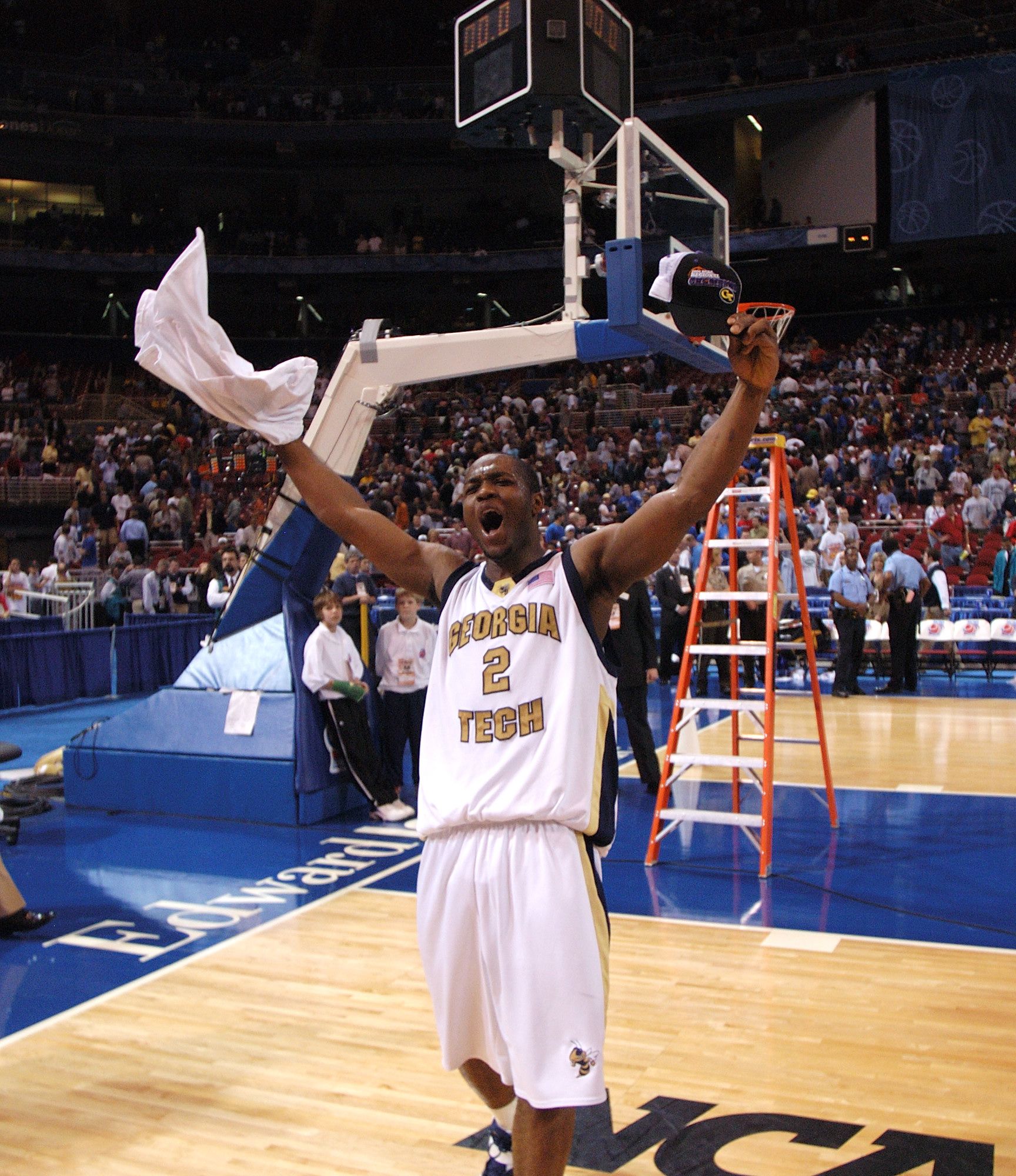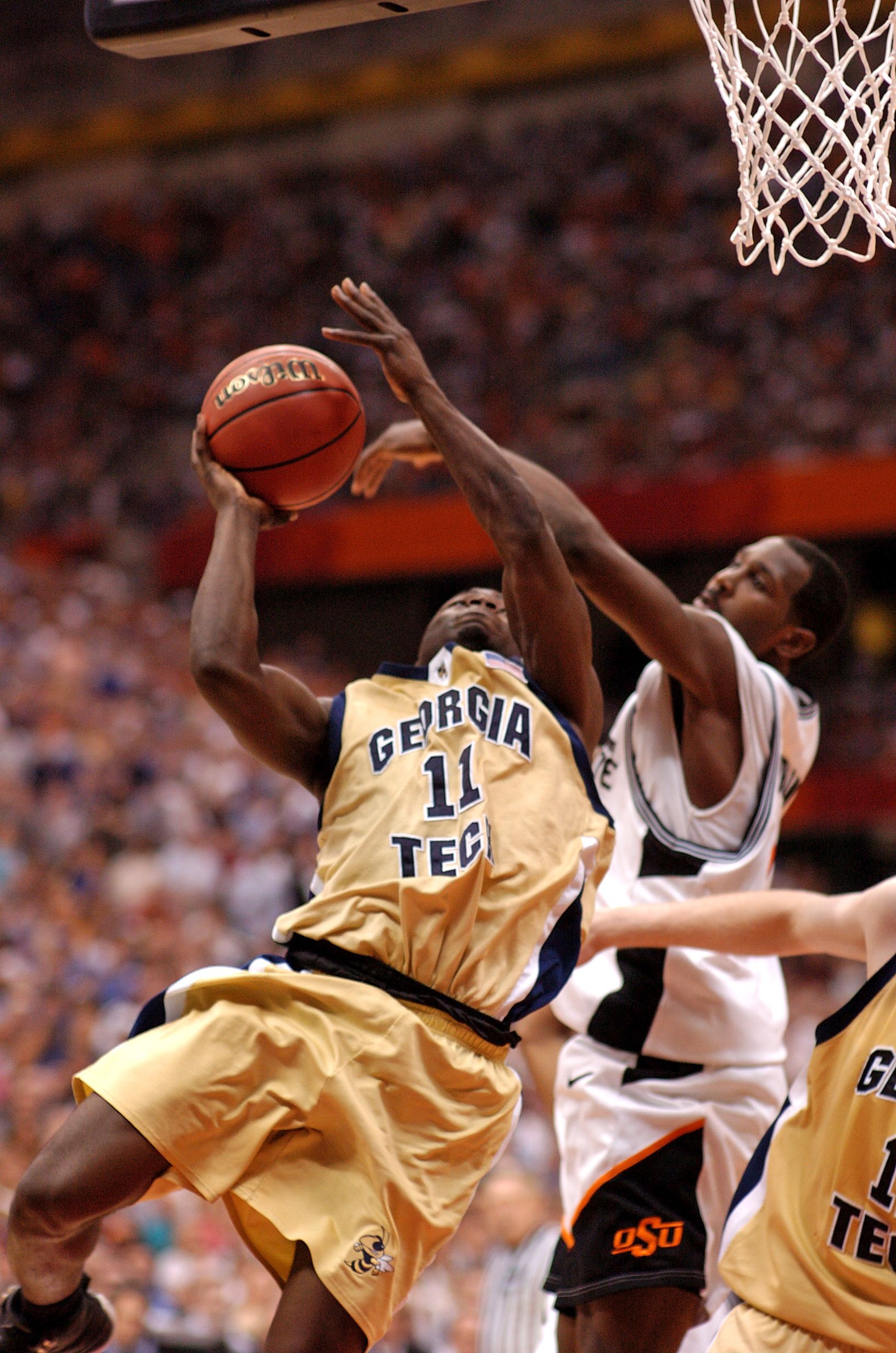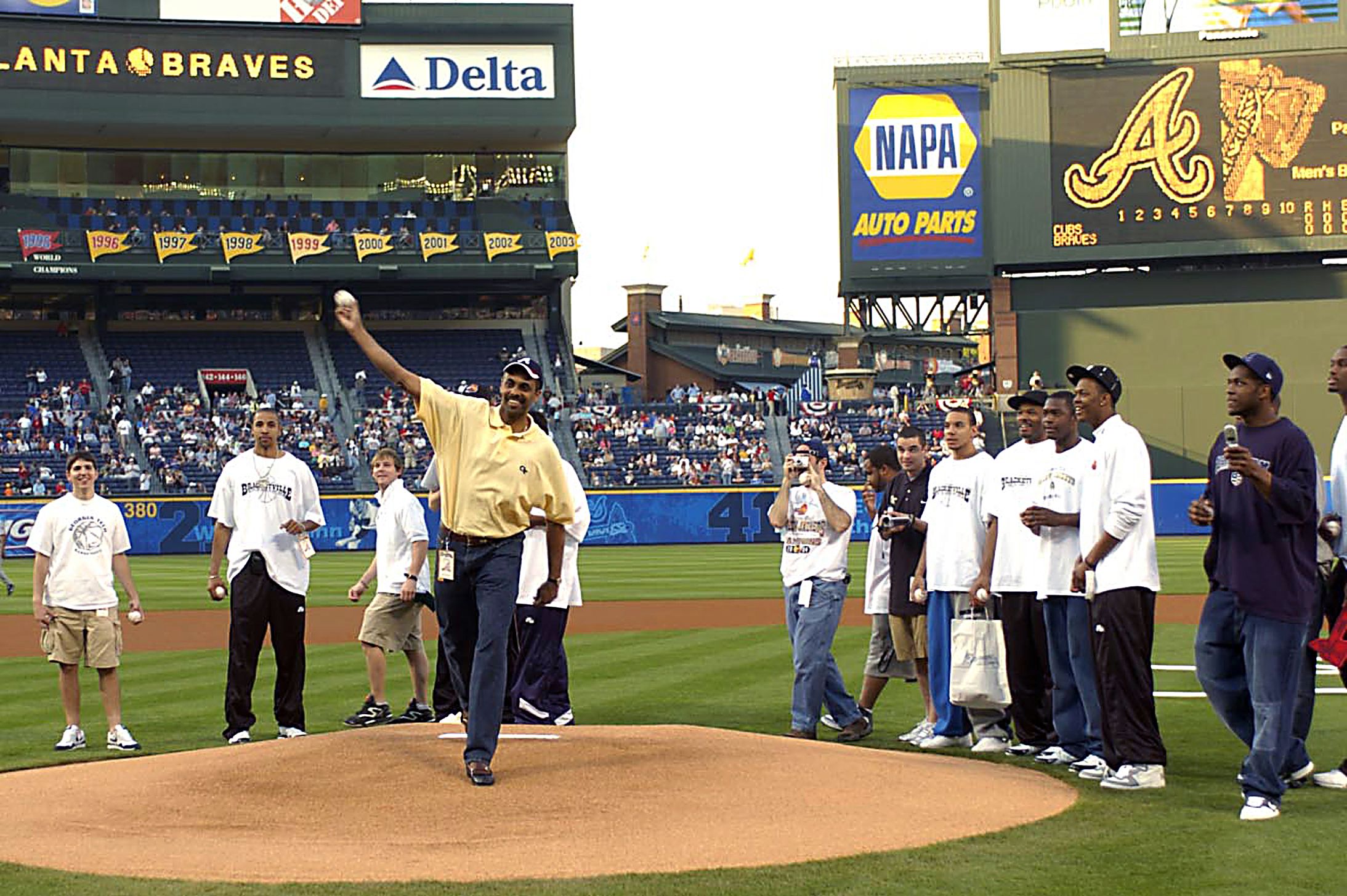The genesis of Georgia Tech’s run to the 2004 NCAA Championship game came many months before the Yellow Jackets went dancing in San Antonio.
The dreams of greatness took place during the summer after some ferocious pickup games in the old dingy freshman gym. That’s where the guys would gather every day and go head-to-head, scraping and scuffling to get better, to get tougher. That’s where the seeds germinated.
“These games would be really competitive,” recalled B.J. Elder. “One day I was sitting there watching – maybe we had lost or whatnot and we were on the side watching other guys play – and I looked at Will Bynum and I looked at Jarrett Jack and I looked at Clarence Moore – and I said, ‘Man, we don’t have any holes. We’re going to the Final Four.’ I said it that day.”
Anthony McHenry said, “Every day after those intense battles, we would go over to the cafeteria, and it’d be like nothing ever happened. I think B.J. was the first to notice this team could be special and I remember him saying, ‘If we can compete like this against each other, it’s going to be tough for other teams to beat us.’”
It was a period of uncertainty for the program. The Yellow Jackets had lost its superstar when Chris Bosh jumped to the NBA after one season. That was the main reason the Yellow Jackets were picked to finish next-to-last in the preseason ACC poll.
That turned out to be a factor that drew the team closer.
“Coach (Paul) Hewitt made it very clear that he didn’t want a one-man show,” said Is’mail Muhammad. “He preferred to have five or six guys averaging eight, 10, 12 points. I think we had multiple superstars on the team. You put them on a different team, and I think everyone’s numbers would have been high.
“B.J. could have averaged more, Jarrett could have averaged more, I could have averaged more. But everyone sacrificed their personal games to fit our system and our style of play. That’s why we were so successful, because everyone was selfless.”
The Yellow Jackets served notice of something special when they won the Pre-Season NIT, defeating No. 1 Connecticut in the semifinals.
Regular-season success
Georgia Tech changed a lot of minds early by winning its first 12 games, including the Preseason NIT Tournament at Madison Square Garden. That’s when the beliefs began to change.
“I was a little slow on the uptake of how good we were,” center Luke Schenscher said. “Beating UConn in the Preseason NIT was probably a good enough sign that we were a special team, but for me it really hit home when we went to Duke and snapped their 41-game home winning streak. I remember sitting in the locker room after the game and thinking, ‘Bloody hell, we might be one of the best teams in the country and have a chance to do something really special this year.’”
The players continued to buy into the big dreams as the season went along. They got stronger while being tested against a rugged ACC schedule.
“That was one of the toughest stretches in the history of the ACC,” Muhammad said. “From top to bottom, there were no nights off, and the top half of the ACC was just brutal. But it set us up for that tournament run because every ACC game was that intense, that difficult, that challenge.”
As the season progressed, each player recognized their individual strengths and weaknesses and played to them.
“That rare for guys to look and assess what’s going on and fall into line with what’s going to be the best way for us to win games,” Elder said. “Nobody really fought it, which is a good thing.”
Tech finished fourth in the ACC, lost to Duke in the second round of the ACC Tournament and opened the NCAA Tournament in Milwaukee, where the Yellow Jackets beat Northern Iowa 65-60 and Boston College 57-54 to advance to the St. Louis Regional. There, Tech outlasted Nevada 72-67, and Kansas 79-71 in overtime.
The win over Kanas was the biggest test, since the game was played in St. Louis and was basically a home game for the Jayhawks.
Isma’il Muhammad and the Yellow Jackets defeated Nevada and Kansas at the NCAA Regional in St. Louis in front of a partisan Jayhawks crowd to advance to the Final Four. (photo by Christopher Gooley)
The NCAA semifinal
The most unforgettable moment came in the national semifinal against Oklahoma State in San Antonio. Georgia Tech had allowed a 12-point second-half lead to wither away, and the game was tied with 26.3 seconds remaining. Oklahoma State called timeout to set up its defense and Hewitt drew up the final play. It was unanimous consent about who should take the final shot.
“In the timeout when Coach Hewitt was setting up the play, we all agreed that Will was going to be the guy,” Schenscher said. “We were all happy to put it in his hands and live or die off him. He had been hitting clutch shots all tournament, and we had full faith that he was going to get it done.”
Muhammad said, “I know a lot of us would love to have the ball, because we believed in ourselves and believed we had the ability to make the play. But we unanimously said, ‘Will, we’re going through you.’ And he didn’t blink.”
McHenry said, “I remember coming to that huddle during that timeout, and Coach was drawing up a play. Then he looked up and asked us who we wanted to take the last shot, and everybody pointed at Will. That was difficult, but it speaks to the character and maturity of the team because you had guys who wanted to win it, but understood that Will Bynum was kind of made for those types of moments.”
The play was simple. With plenty of time remaining, Tech brought it up the court and into the hands of Jack, who dribbled and passed to Bynum with 10 seconds left. He took a dribble and waited for Schenscher to set a screen at the top of the key. With five seconds left, Bynam went around the screen and drove to the hoop, where the running right-handed shot fell through with 1.5 seconds remaining.
Oklahoma State, with no timeout, could only inbound the ball and heave a desperation three-quarters length shot that had no chance. Georgia Tech had cemented its place in the championship game.
“It was just sheer excitement,” Muhammad said. “I remember running down the court and grabbing Will and putting him in a friendly choke hold. It’s like an out-of-body experience. You don’t even control your emotions. You just react and all I remember was just happiness.”
When the ball dropped in, Schenscher turned and gave a fist pump as he sprinted back down the court.
“I’ve copped a bit of flack over the years for my awkward fist pump,” Schenscher said. “There was a great photo of Marvin jumping into my arms after the buzzer. It was pure adrenaline.”
Tech got 19 points and 12 rebounds from Schenscher, 15 points from Lewis, 10 points and five assists from Jarrett Jack. Bynum came off the bench to score 11.
“Everyone contributed,” Muhammad said. “It was a testament to our team. We weren’t carried by anyone. Through certain stretches people got more notoriety or were more popular, whether it was Jarrett or myself or B.J. But if you remember that game, Luke played great, Marvin Lewis got off to a hot start, the shot that Will made. I had my moments, Anthony McHenry had his moments. People say this, but it was true. It was truly a team win.”
Head coach Paul Hewitt drew up a play to give Will Bynum the game-winning shot against Oklahoma State in the national semifinal game. (photo by Christopher Gooley)
The aftermath
The Yellow Jackets didn’t have the magic in the final against UConn. They trailed 41-26 at halftime and were beaten 82-73 for the championship. Although it was a disappointing finish, the players took away mostly positive feelings about the season.
“Looking back on it, everyone’s reaction, everyone’s appreciation at Georgia Tech – players, alumni, fans of the school – everyone was able to have that moment,” Muhammad said. “You still hear it to this day. People pull me to the side and say it was the most fun they ever had. Twenty years later people still stop us.”
Schenscher said, “We had a chance to experience what it’s like to rock stars for a brief moment. The crowds flocking to us as we got on and off the buses was almost overwhelming. It was very unreal to go from obscurity to being nationally recognized and a great feeling helping all the Georgia Tech community feel proud to be a Yellow Jacket.”
McHenry said, “I remember being very proud of the guys I played with and very proud of Coach Hewitt. They’re still some of my closest friends. I talk to B.J. just about every day.”
Tech celebrated its trip to the national championship game at an Atlanta Braves game after the team returned to Atlanta.
Where are they now?
Elder came back the next year and finished his four-year career with 1,616 points. He was a two-time All-ACC selection. He played professionally in the NBA’s Developmental League, as well as in Germany, Italy and France. He was inducted in the Georgia Tech Sports Hall of Fame in 2017. He is currently an assistant coach on coach Damon Stoudamire’s staff at Tech.
Schenscher returned to finish his career and led the team in field goal percentage as a senior. He played in the D-League and played for Chicago and Portland in the NBA. He played one season in Germany and spent the remainder of his playing career in Australia, playing for Adelaide, Perth and Townsville. He retired in 2017 and now coaches junior players.
“I tell all the kids I was a rock star in Atlanta for 15 minutes, 20 years ago,” Schenscher said. “But they don’t believe me.”
McHenry returned to finish his career a year later and spent time in the NBA’s D League and in Great Britain. He signed with Ryukyu of the Japan League and spent eight seasons there and one with Shinshu. Ryukyu retired his jersey, and he’s currently working for the team as an assistant coach.
“I didn’t even know they played basketball in Japan,” McHenry said. “They have embraced me with open arms, and I couldn’t be more happy in the place that I am now.”
Muhammad came back in 2005 and fought through tendinitis in his right knee to have a strong conclusion to his career. He earned a management degree from Tech and joined Barton Muhammad Search as managing partner in 2006.
Bynum went on to play in the NBA with Golden State, Detroit and Washington and made stops in Israel, China and Turkey.
Jack came back for his junior season and afterwards entered the NBA draft, where he was Denver’s first-round pick. He was traded on draft night to Portland, where he played for three seasons. He went on to play for Indiana, Toronto, New Orleans, Golden State, Cleveland, Brooklyn and New York. He is currently an assistant coach for the Detroit Pistons.
Marvin Lewis graduated with honors from Tech later that summer. He earned a Masters degree from Georgia State in 2008 and returned to The Flats in 2014 to become associate athletics director for finance and administration. He is now the director of athletics at George Mason University.
The players remain in contact with each other, even though they’re scattered to the four corners of the world.
“We didn’t become close because we had success,” Muhammad said. “We were already close and being a close-knit family helped us become successful. That’s why we’re incredibly close – still.”













